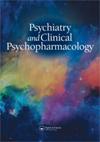PDW and RDW are new parameters for bipolar episodes and unipolar depression
IF 0.6
4区 医学
Q4 PHARMACOLOGY & PHARMACY
引用次数: 9
Abstract
ABSTRACT INTRODUCTION: Bipolar disorder (BD) and unipolar depression (UD) are complex and multifactorial mental disorders characterized by mood swings, disability, and impaired quality of life. In the present study, we researched the roles of inflammatory cells and their value as inflammation markers in BD and UD. OBJECTIVE: Sixty-nine manic, 60 euthymic, and 70 UD patients and 60 sex-matched healthy volunteers (control group) were retrospectively analysed. Platelet (PLT), platelet distribution width (PDW), and red cell distribution width (RDW) levels were measured in four groups. The aim of this study was to evaluate PLT, PDW, and RDW levels patient with UD and two different phases of BD: euthymic and manic. RESULTS: In our study, 199 patients and 60 controls were included. There were no differences between the patients and the healthy control group participants in terms of age and sex. The bipolar episodes and the UD patient group were statistically significantly different from the healthy controls in terms of PLT, PDW, and RDW. CONCLUSION: Our study is the first in the literature to compare blood PLT, PDW, and RDW levels in bipolar episodes, UD patients, and healthy control groups. We believe that the levels of PLT, PDW, and RDW can be used as novel markers of bipolar episodes and UD. More detailed and larger prospective clinical studies are required to confirm these findings.PDW和RDW是双相发作和单相抑郁的新参数
摘要简介:双相情感障碍(BD)和单相抑郁症(UD)是复杂的多因素精神障碍,其特征是情绪波动、残疾和生活质量受损。在本研究中,我们研究了炎症细胞在BD和UD中的作用及其作为炎症标志物的价值。目的:回顾性分析69例躁狂、60例常郁、70例UD患者和60例性别匹配的健康志愿者(对照组)。测定四组患者血小板(PLT)、血小板分布宽度(PDW)、红细胞分布宽度(RDW)水平。本研究的目的是评估UD和两种不同阶段双相障碍患者的PLT, PDW和RDW水平:心境和躁狂。结果:本研究纳入199例患者和60例对照组。在年龄和性别方面,患者与健康对照组参与者之间没有差异。在PLT、PDW和RDW方面,双相发作和UD患者组与健康对照组有统计学差异。结论:我们的研究是文献中第一个比较双相情感障碍发作、UD患者和健康对照组血液PLT、PDW和RDW水平的研究。我们认为PLT、PDW和RDW的水平可以作为双相情感障碍发作和UD的新标志物。需要更详细和更大规模的前瞻性临床研究来证实这些发现。
本文章由计算机程序翻译,如有差异,请以英文原文为准。
求助全文
约1分钟内获得全文
求助全文
来源期刊

Psychiatry and Clinical Psychopharmacology
Medicine-Psychiatry and Mental Health
CiteScore
1.00
自引率
14.30%
发文量
0
期刊介绍:
Psychiatry and Clinical Psychopharmacology aims to reach a national and international audience and will accept submissions from authors worldwide. It gives high priority to original studies of interest to clinicians and scientists in applied and basic neurosciences and related disciplines. Psychiatry and Clinical Psychopharmacology publishes high quality research targeted to specialists, residents and scientists in psychiatry, psychology, neurology, pharmacology, molecular biology, genetics, physiology, neurochemistry, and related sciences.
 求助内容:
求助内容: 应助结果提醒方式:
应助结果提醒方式:


